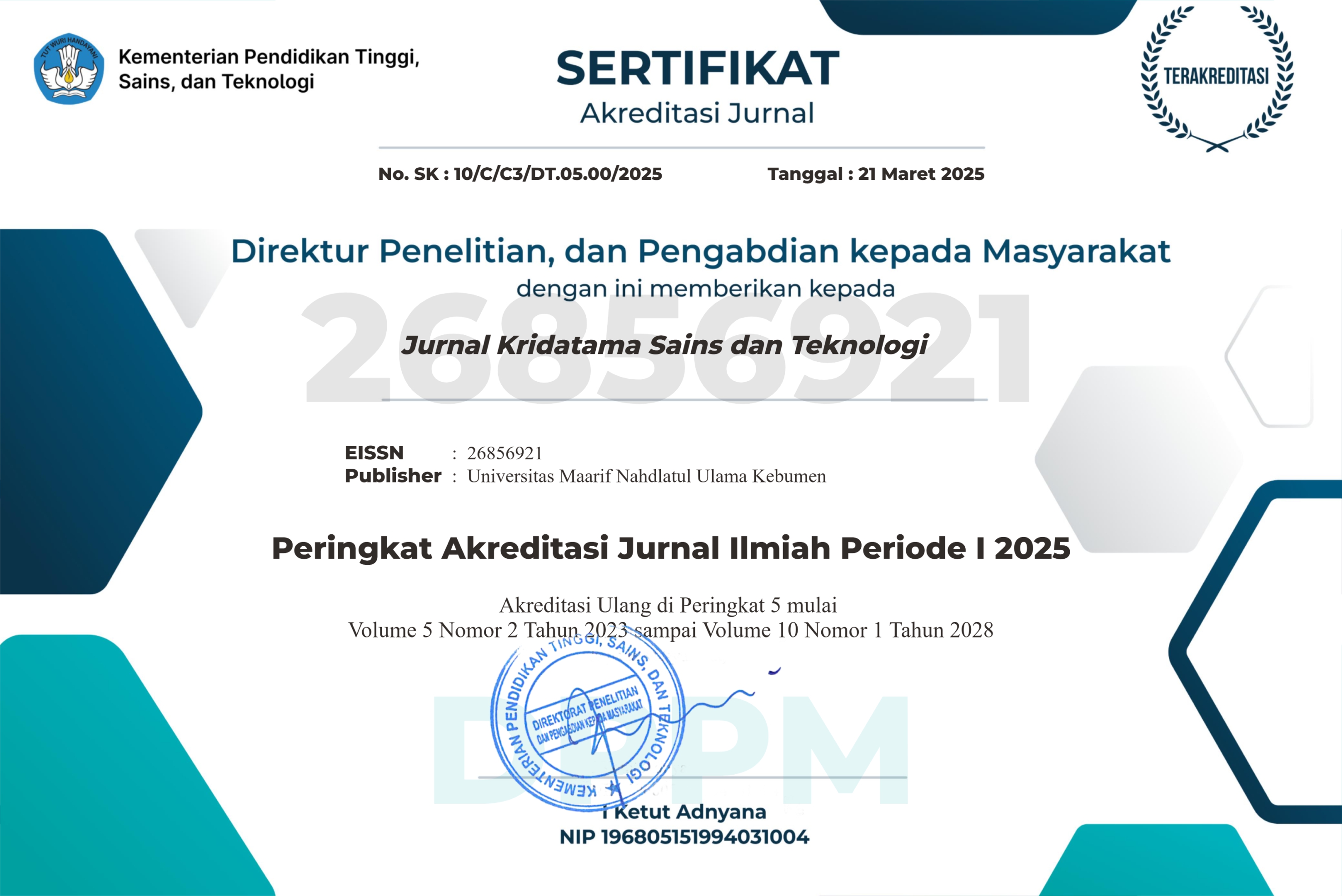Strategi Peningkatan Mutu Lembaga Pendidikan Madrasah
DOI:
https://doi.org/10.53863/kst.v5i01.698Keywords:
Concept of Quality, Quality of Education, Quality StrategyAbstract
The quality of education is the main goal that every madrasa wants to achieve. Quality is a must that must be achieved in order to increase public trust in madrasas. Because quality-oriented madrasahs will be the institutions of choice, this is because most madrasas, especially madrasahs managed by the community, have suffered setbacks. The quality of madrasah education services will be determined by the extent to which madrasahs can optimally manage all existing capabilities and resources, the paradigm that must be built by madrasahs is to build quality. This research method uses descriptive qualitative research methods dan the type of research used is the library research method . is a study based on the philosophy of postpositivism that uses interpretative and constructive paradigms. Quality management aims to improve the quality of work, increase productivity and efficiency by increasing performance and improving the quality of work. High-quality education is not only reflected in the quality of graduates but also in the quality of educational institutions that can meet and serve customer needs according to applicable quality standards. The central basic technique for continuous quality improvement is improving the quality of all objects processed in education administration, starting from teachers, students, curriculum, learning processes, educational institutions, financing, and also relations with the community. Madrasas that live mainly from, through, and for the community need attention and support from all parties. Quality improvement does not occur without input from all parties. Therefore, to improve their quality, madrasas must be assisted to maintain and struggle so that they can live and develop and compete with other educational institutions.
Keywords: Concept of Quality, Quality of Education, Quality Strategy
References
Saifulloh, M., Muhibbin, Z., & Hermanto, H. (2012). Strategi peningkatan mutu pendidikan di sekolah. Jurnal Sosial Humaniora (JSH), 5(2), 206-218.
Amali, O. (2000). Evaluasi Kurikulum. In Evaluasi Kurikulum (p. 22). Remaja Rosdakarya.
Arcaro, J. S. (2007). Pendidikan Berbasis Mutu. In Pendidikan Berbasis Mutu (p. 77). Pustaka Pelajar.
Atmodiwiro, W. B. (2020). Manajemen Pendidikan Indonesia. In Manajemen Pendidikan Indonesia (p. 22). Penerbit Ardajaya.
Azwar, Sarifudin, “Metode Penelitian,” in Metode Penelitian (Yogyakarta: Pustaka Pelajar, 2010), 35.
Depdikbud. (1998). Panduan Manajemen Sekolah. In Panduan Manajemen Sekolah (p. 151). Direktorat Jenderal Pendidikan Dasar dan Menengah.
Depdiknas. (2001). Kamus Besar Bahasa Indonesia. In Kamus Besar Bahasa Indonesia (p. 768). Balai Pustaka.
Fauzi, A., Suryapermana, N., & Ruhmawan, I. (2022). Strategic Management and Educational Dynamics of Islamic Boarding Schools in Banten. AL-ISHLAH: Jurnal Pendidikan, 14(3), 3877–3888. https://doi.org/10.35445/alishlah.v14i3.1538
Kambey, D. C. (2014). Landasan Teori Administrasi. In Landasan Teori Administrasi/Manajemen (pp. 34–35). Yayasan Tri Ghanesa Nusantara.
Kuntoro, A. T. (2019). Manajemen Mutu Pendidikan Islam. Jurnal Kependidikan, 7(1), 84–97. https://doi.org/10.24090/jk.v7i1.2928
Maulana, A., Jahari, J., Manajemen Pendidikan Islam, P., & Sunan Gunung Djati, U. (2019). Implementasi Manajemen Mutu Pendidikan di Madrasah Swasta (Vol. 1, Issue 2).
Mulyasa, E. (2006). Manajemen Berbasis Sekolah. In Manajemen Berbasis Sekolah (p. 131). Remaja Rosdakarya.
Murdiyanto, E. (2020). Metode Penelitian Kualitatif (Sistematika Penelitian
Kualitatif). In Bandung: Rosda Karya. http://www.academia.edu/download/35360663/METODE_PENELITIAN_KUALITAIF.docx
Nugraa Suharto. (2019). Management Pendidikan. In Manajemen Pendidikan (p. 302). Alpabeta.
Nurhaya, A. H. dan N. (2010). Manajemen Mutu Pendidikan. In Manajemen Mutu Pendidikan (pp. 100–101). Alpabeta.
Nurkholis. (2013). Manajemen Berbasis Sekolah, Teori, Model dan Aplikasi. In Manajemen Berbasis Sekolah, Teori, Model dan Aplikasi (p. 68). PT. Gramedia Widyasarana.
Nurkholis. (2013). Manajemen Berbasis Sekolah. In Manajemen Berbasis Sekolah (pp. 78–79). PT. Gramedia Widyasarana.
Qomar, M. (2015). Dimensi Manajemen Pendidikan Islam. In Dimensi Manajemen Pendidikan Islam (p. 205). Erlangga.
Ristianah, N., & Ma’sum, T. (2022). Konsep Manajemen Mutu Pendidikan. Tabyin: Jurnal Pendidikan Islam, 4(01), 45–55. https://doi.org/10.52166/tabyin.v4i01.169
Rohiat. (2019). Manajemen Sekolah. In Manajemen Sekolah, Teori Dasar dan Praktek (p. 52). PT. Refika Aditama.
Sagala, `Syaeful. (2017). Manajemen Strategik dalam Peningkatan Mutu Pendidikan. In Manajemen Strategik dalam Peningkatan Mutu Pendidikan (p. 170). Alpabeta.
Sallis, E. (2019). Total Quality Management in Eduation. In Total Quality Management in Eduation (pp. 51–53). Kagon Page Ltd.
Sallis, E. (2019). Total Quality Management in Education. In Total Quality Management in Education (Kogan Page, p. 68).
Sudarmin. (2019). Visi Baru Manajemen Sekolah. In Visi Baru Manajemen Sekolah (p. 124). Cipta R.
Sugiyono, D. (2013). Metode Penelitian Kuantitatif, Kualitatif, dan Tindakan.
Suryosubroto. (2014). Manajemen Pendidikan di Sekolah. In Manajemen Pendidikan di Sekolah (p. 210). Rineka Cipta.
Winasanjaya. (2017). Kurikulum dan Pembelajaran Teori dan Praktek. In Kurikulum dan Pembelajaran Teori dan Praktek Pengembangan Kurimulum Tingkat Satuan Pendidikan (KTSP) (p. 5). Kencana Prenada.
Zohriah, A., Fauzi, A., & Pandini, I. R. (2022). The Impact of Managerial and Principal Academic Supervision on Teacher Performance. Nidhomul Haq?: Jurnal Manajemen Pendidikan Islam, 7(3), 434–449. https://doi.org/10.31538/ndh.v7i3.2607
Downloads
Published
How to Cite
Issue
Section
License
Copyright (c) 2023 Anis Zohriah,Machdum Bachtiar,Anas Nasrudin

This work is licensed under a Creative Commons Attribution-ShareAlike 4.0 International License.
Authors retain copyright and grant the journal right of first publication with the work simultaneously licensed under a Creative Commons Attribution-ShareAlike 4.0 International License that allows others to share the work with an acknowledgment of the work’s authorship and initial publication in this journal

















